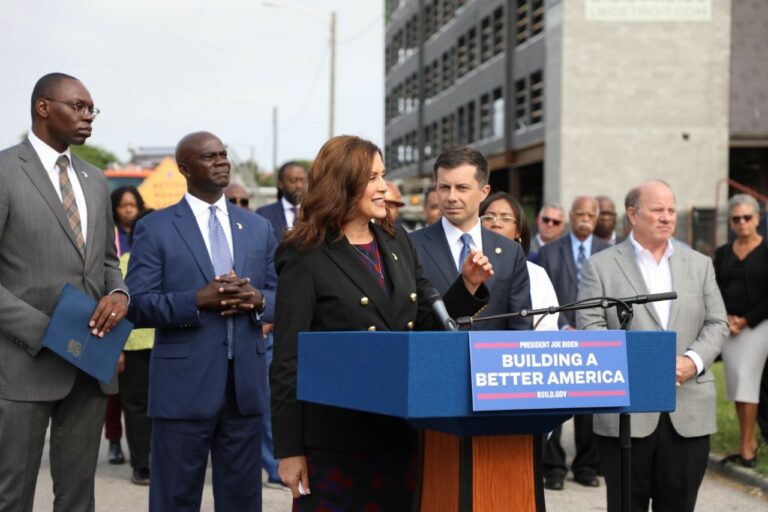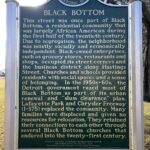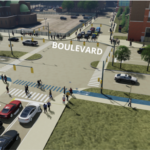
- Kim Kisner
- Community
- 12/20/2022
The I-375 Infrastructure Project – Impacting Economic Development, Stormwater Management, Connectivity, and Workforce Development

The conversion of I-375 into an urban boulevard is a profoundly meaningful project that will replace the divide that leveled the Black Bottom neighborhood and Paradise Valley entertainment district more than 60 years ago.
Now, the Michigan Department of Transportation (MDOT) is funneling $104,657,051 from the President’s Bipartisan Infrastructure Law that passed last year to replace the one-mile-long freeway and develop a lower-speed urban boulevard with the impetus to recognize the wrongdoing of the past and get it right for the future.
In this – the second of our two-part series, Jonathan Loree, MDOT senior project manager, talks about the importance of the project in terms of social and environmental justice, as well as development and infrastructure.
Loree has worked for MDOT for 18 years and has been involved in the design, construction, and planning of major projects, including work as MDOT’s lead on the M-1 Rail streetcar on Woodward Avenue. He has been project manager for the I-375 Improvement Project since 2017.
Q: From your perspective, what will this new boulevard bring to the area?
A: I think it’s about connection. Reconnecting communities and creating new opportunities for those communities.
I- 375 was built during the freeway boom and in the name of ‘urban renewal,’ and it’s just not the right infrastructure for the last mile into downtown, so it was time to look at how we can make this area more efficient and move toward a more sustainable and connected future.
This is the heart of the city, and the boulevard will serve pedestrians and cyclists well, and move people around better – in ways that the freeway clearly cannot accomplish.

The way downtown connects to neighborhoods – both east and west, as well as north and south – will be drastically improved, and some elements of the former street grid will be redesigned back into the road network, where possible. Ultimately it will be a much more useful corridor in terms of moving people around, offering walkable options, and opening real estate for potential development.
This will also eliminate some of the vehicle usage in that area and effectively replace a large concrete infrastructure with a more environmentally and community-friendly passageway.
Q: What about the sustainability aspects?
A: This project gives us roughly 31 acres of property beyond the roadway since we will be reducing the pavement footprint.
Developing this land toward furthering the community, the economy, and social equity is absolutely the goal. And to achieve this, stakeholders, the city, and the residents are working together.
There will be pockets of spaces and medians, etc., that will give us opportunities to improve the aesthetics and environment – whether that be plants and vegetation and grass or artwork or items that commemorate the past. And from a sustainability standpoint, we’ll be eliminating the bridges and reducing the amount of pavement and replacing that with a boulevard that better serves the area now and into the future.
We also are implementing a new stormwater management system.
Q: How will the new system help ameliorate stormwater issues?
A: Clearly the recessed freeways and current stormwater systems are not built to handle the multiple 100-year storms that we are seeing. There is just no place for that much water to go within the current system. This project gives us the chance to build new infrastructure to handle it much better for the area in the future.
We’ll be constructing gravity-fed pipes that will allow us to treat and release the water directly to the Detroit River. This will take the load off of the current system, which consists of two aging pump stations and outlets into the Detroit Water and Sewerage Department system. Less flow in the combined sewer system will help mitigate the overflow and flooding on the freeway and in nearby homes.
Q: What are the economic factors?
A: This is a very valuable piece of property close to downtown, and it’s a high-traffic area with a lot of potential for development and new businesses. We’ll also be putting people to work and looking for minority contractors to work on the project.
The connectivity between neighborhoods means more people on foot and on bicycles to walk into stores and restaurants and bars and improve business in those areas.
Q: Speaking of putting people to work, this project will involve workforce development, correct?
A: Yes. We want this property to provide long-term benefits and we are looking at leveraging the project and the outcomes toward that. This includes workforce development, providing more opportunities to disadvantaged businesses, entrepreneurs and small business enterprises and more.

Construction begins in 2025 and we are currently looking at how best to engage and get people involved in trades and training people to participate.
Q: Is this a unique project for MDOT?
A: Absolutely. We are embarking on a design and construction project to acknowledge mistakes made in the past and create better infrastructure for the future. Not only for the corridor but for the city and state and for the people.
Honoring the past and building an environment that facilitates live, work, and play for now and into the future is important and necessary.
Q: What about planning for future connectivity and technology?
A: There is a lot of talk about autonomous vehicles and interest in how transit will play into this and what that looks like for the future. We will develop this infrastructure to support and facilitate flexibility for the future to the best of our ability and knowledge now.
Be sure to subscribe to our newsletter for regular updates on sustainable business practices in and around Detroit.
Kim Kisner
- All
- Business
- Community
- Education
- Events

Unique Monique Scented Candles, a Detroit-based business founded by Monique Bounds., aims to produce candles and household products with clean ingredients and local supply chains. What began as a personal hobby during college has evolved into a full-time venture producing coconut oil and soy-based candles made with essential oils and locally sourced materials. SBN Detroit interviewed Bounds about launching a sustainable product line, sourcing challenges in Michigan, and...

Eastern Market Partnership, in collaboration with the City of Detroit’s Office of Sustainability Urban Agriculture Division, has announced $240,000 in grant funding to support Detroit-based farmers and farmer collectives. The grants will advance food access, climate education, sustainable land use, and economic opportunity, with priority given to Black- and Indigenous-led farms, youth-led initiatives, and projects rooted in historically disinvested neighborhoods. The recipients – ranging from cooperatives and community...

Citizen Robotics is a Detroit-based nonprofit that advances the use of robotics and digital manufacturing in residential construction, focusing on improving productivity, sustainability, and long-term affordability. Best known for its early work in 3D-printed housing, it explores how alternative construction methods and new financial models can reduce material waste, lower lifetime operating costs, and enhance the resilience of homes. SBN Detroit interviewed Tom Woodman, founder and president of...







